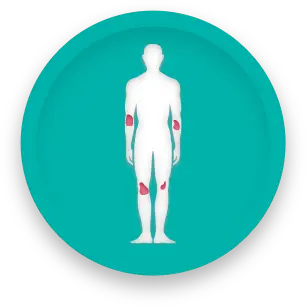patient survey results
In 2018, Ortho Dermatologics partnered with the National Psoriasis Foundation to conduct an online survey with real patients to gain a better understanding of their experiences with psoriasis. Upon completion of the survey, a total of 314 patients shared their thoughts.

68%
of patients were diagnosed with moderate to severe psoriasis (covering >3% to >10% of their body).

62%
of patients had tried 5 or more treatments to control their psoriasis.

93%
of patients are open to trying a new treatment
Tips
Tips for living with plaque psoriasis
In addition to treatment, there are some things you can do on a daily basis
that can help you stay healthy and manage your psoriasis.
Moisturize
Ask your dermatologist about the types of lotions and bath soaps that can soothe your skin.
Exercise and eat healthily
This is important since people with psoriasis are at higher risk for diabetes and other conditions. Ask your doctor what a healthy diet and exercise regimen means for you.
Drink less alcohol, smoke less, and watch your weight
Drinking, smoking, and gaining weight may worsen the symptoms of psoriasis.
Watch out for joint stiffness
Pay attention to whether your joints feel sore or stiff, especially in the morning. These can be signs of psoriatic arthritis.
Pay attention to your nails
Take a look at your nails often to see if the nail beds are yellowish-orange in color or have pits or ridges. These can also be signs of psoriasis.
Talk to someone
It is normal for people with psoriasis to experience feelings of sadness, lack of sleep, and trouble focusing on work or even basic tasks. You may also feel self-conscious about the scaly patches on your skin. If so, it is important to talk to someone and not suffer in silence. You should never feel afraid to ask for help or talk to someone.
Talk to your doctor about your treatment
If you have questions about your medicine including about side effects or the cost of treatment, talk to your doctor. Always talk to your doctor before changing or stopping your treatment.






